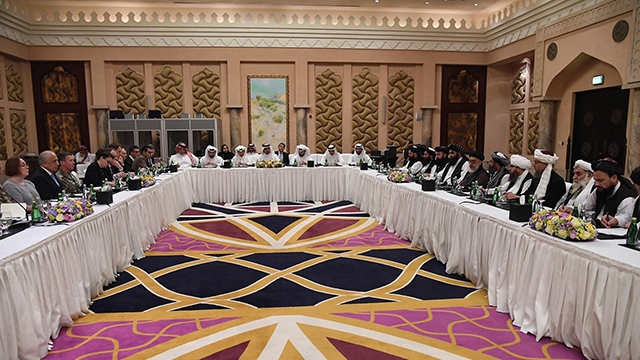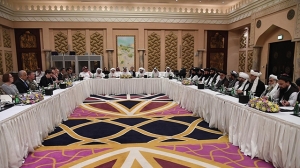Afghanistan's Doha Agreement & Its Geopolitical Implications
Op-ed
On February 29 a historic event took place in the capital of Qatar, Doha. The US government officials and the Taliban movement's delegation, accompanied by officials of Pakistan, Tajikistan, Uzbekistan and 30 other officials, signed a peace agreement that addresses several noteworthy aspects (the agreement was signed by US Special Representative for Afghanistan, Zalmay Khalilzad and Taliban leader Abdul Ghani Baradar): 1) Reducing the US military contingent to 8600 soldiers (today there are 14,000 NATO soldiers plus 17,000 NATO coalition troops in Afghanistan, including a Georgian contingent of 900 troops). If the Taliban complies with the terms of this agreement for some time, for at least 5-14 months, the US will contribute to withdrawing the NATO contingent. At the same time, the Trump administration is trying to reduce the losses suffered by NATO coalition forces and directly by the US contingent over 19 years (the US lost 2400 military personnel and the NATO coalition 3900 military personnel, including 34 Georgian peacekeepers); 2) Launching negotiations in Afghanistan on March 10 and negotiations with the government of Ghani, who at this stage, as well as the Najibullah government during the Soviet occupation, strongly opposes the withdrawal of foreign military contingents from Afghanistan; 3) Exchange of all prisoners, the release of 5,000 Taliban supporters and release of 1,000 Afghan government officials; 4) Abolition of economic and political sanctions against the Taliban and de facto and de jure recognition of this movement, to happen in May;
5) Joint coordination against international terrorist and non-state religious actors (Daesh and al-Qaeda) and the pledge of the Taliban to stop all cooperation with these jihadist groups; 6) In the wake of these talks, US President Donald Trump plans to meet with Taliban movement leader Mawlawi Hibatullah Akhundzada, who represents a moderate wing of the movement.
The mentioned process began quite dynamically and it is similar to the signing of the agreement between the Vietnamese Communist Government, the Vietcong Guerrilla Movement, and the US Government in January 1972, and is very close to the scenario in which the Democratic Republic of South Vietnam disappeared from political vocabulary in 1975.
Almost the same thing can happen in Afghanistan, and it is unlikely that the current President Ashraf Ghani's government would maintain power once the US actually leaves Afghanistan, as the Taliban has already become a serious military-political entity and controls at least 45% of the territory of the country. With this agreement, President Trump is already launching an election campaign, thereby trying to further bolster his 49% support. Of course, this agreement is directly linked to Georgia and has two factors:
1) The fate of Georgia’s military contingent and their withdrawal can also be negotiated both with the US and the Taliban, as the withdrawal of US contingent increases the likelihood of the Taliban seizing power and also determining the status of this country’s contingent.
2) US withdrawal from Afghanistan may increase drug transit capacity. Based on the fact that as of 2014, it is not excluded that Georgia may become a target of such "black transit" and the volume of illegal Afghan heroin transit may increase, as 40% of Afghanistan's production of public goods comes from opium production and the Taliban will not hamper its exports, including illegal ones and it may even encourage it, but for internal consumption it may impose cruel rules based on Shia Law.
3) Revitalization of the international terrorist network (the same Daesh has a strong foothold in Afghanistan, and despite the Taliban’s resistance, it is unlikely that its influence will diminish); I don't know what position the Georgian government has on this issue and what it thinks about it, hopefully time will tell.
However, summarizing, it is interesting to consider how the situation may evolve after the final withdrawal of NATO and the United States from the country still mired in a civil war. Once a foreign military contingent is withdrawn, the Taliban will seize power in Afghanistan and revive the project of Islamic Emirate of Afghanistan, which began in 1996 and ended in 2001.
However, the country may be divided into several zones of influence and come to resemble a slice of "apple pie". The ethnic Uzbek and Tajik political forces will be strengthened in the north of the country, even under the command of Uzbek field commander General Dustum, who will be supported by Russia and Uzbekistan; and the so-called "safety zone" will be created to defend the post-Soviet space from Taliban and other jihadist groups. The central and eastern part of the country will be controlled by the central Taliban government, which will be supposedly backed by the Islamic Republic of Pakistan. In the southern part, it is not excluded that the Daesh Khorasan province and the al-Qaeda network may share areas of influence. At the same time, the Shiite group of Ismailis will continue to control the autonomous region of Badakhshan. This is what will happen as a result of the implementation of this agreement. The so called Haqqani drug cartel and local clan governors should be mentioned separately; they will have "friendly" relations with all of these groups, and it is likely that Afghan opium exports will increase further, at least three times, in all directions (at the expense of the Taliban and the so-called "Karachi drug cartels").
By Vakhtang Maisaia, Professor, Doctor of Political and Military Sciences
Image source: NewYorkTimes












